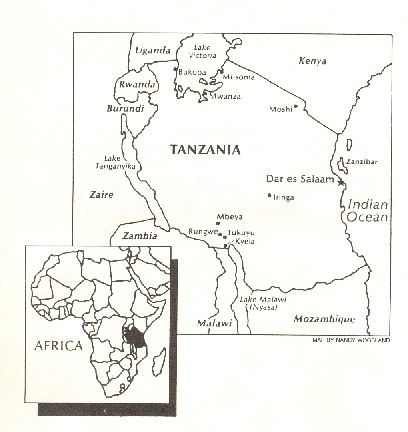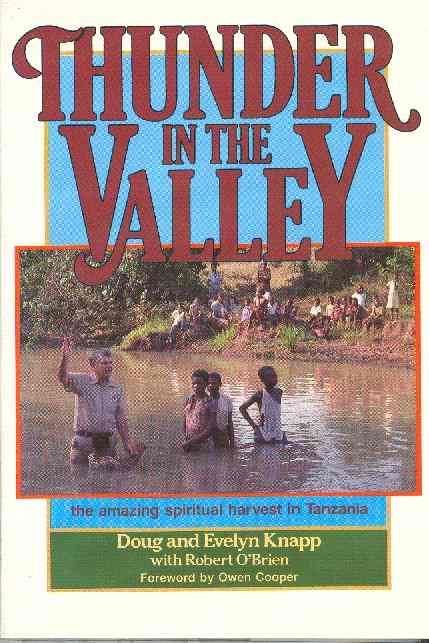Missionary Biography:
Doug and Evelyn Knapp
Thunder in the Valley:
The amazing spiritual harvest in Tanzania
Golden Gate Baptist Theological Seminary
Mill Valley Campus
Introduction to Missions ~ P1211
Dr. J. Ray Tallman
Fall 2002
by
Chris A. Foreman
Box 780
October 9, 2002
Mill Valley Campus
Introduction to Missions ~ P1211
Dr. J. Ray Tallman
Fall 2002
Chris A. Foreman
Box 780
October 9, 2002
 |
I. General Overview of life and Ministry Focus of Doug and Evelyn KnappDoug Knapp was born in 1927. He was raised on a farm in Florida and studied agriculture as a youth. He married Evelyn, who was a few years younger, in 1949. Doug and Evelyn were both long-time Christians and were always pulled toward a full time Christian ministry. Doug was successful in agribusiness and even emceed a Florida TV show about flowers and gardens. Their oldest daughter was born in 1949 and their youngest son in 1966. In between were two sons. In 1955 Doug applied to the foreign missions board of the SBC. He was seeking a position as something called an "agricultural missionary". This position was new to the mission board. Time passed. Doug thought that the opportunity for missions had also passed, but in 1964 he and his wife were appointed as agricultural missionaries to Tanganyika (which became Tanzania in 1964). After a few years preparing in country, the missionary couple with four children found their way to the most remote part of Tanzania, near Lake Nyasa on the Malawi border. It was here that he began his agricultural missionary work. For a decade Doug and Evelyn toiled, winning the good will and trust of the people around him. He introduced new seeds, crops and methods to the local tribes. Doug was a professional horticulturist and was never ordained as a minister. At first he was reluctant to preach and to baptize, but soon he was preaching weekly and by his own count he has personally baptized over seven thousand Africans. There has been a great missionary harvest in the Kyela district of Tanzania. His mission has been extremely successful. It has become a model of how modern Christian missions can work all over the world.These are the ten factors that Doug lists as reasons for their success in Tanzania.
2. A ministry of assistance - they helped the people in material ways (crops). 3. Special Concern for pastors - They helped and supported local pastors. 4. Church development emphasis - emphasized church planting and missions. 5. Use of national evangelists - Six, then eight men served as local evangelists. 6. Youth and women's programs - many children attended Sunday Schools. 7. Regular evangelistic campaigns - Every year from 1976 through 1986. 8. Use of volunteers from America - Short term missionaries energized the people. 9. Church construction - help the people to build their own church buildings. 10. Emphasis on schools - Missionaries are permitted to speak at local schools. |
II. Three qualities that made Doug and Evelyn Knapp successfulAs I read through the book I can see several qualities that made Gene and Evelyn Knapp great missionaries. Perhaps the three chief qualities are these:
|
III. Application - How can the missionary work of the Knapps provide a model for my life.As I mentioned earlier, I chose this book and these missionaries because they do indeed provide a real model for what my wife and I can do. I have only experienced missionary work one month at a time. My desire is to spend more time in missions and maybe become a full-time missionary. God has His plan for my life. I can only say "amen" to the Knapp's ten factors. I have experienced several of them myself in Rwanda. I feel the key is to work with local pastors that you trust implicitly. This can only happen with deep experience. Special evangelical campaigns do energize and motivate people. I seems like the best mission formula is a continuing level missionary commitment in country mixed with occasional bursts of energy from the outside. Church planting and sending the native pastors on nearby missions is important. I believe that God has given me many talents. I do not want to bury them in the ground of America. I want to invest them in Africa and see if I can increase them one-hundred fold.
|